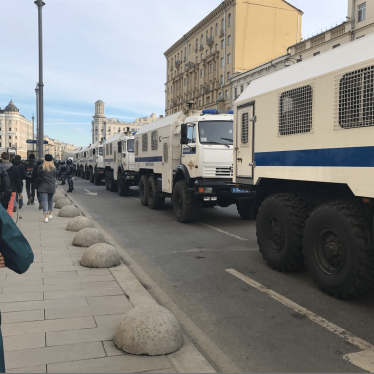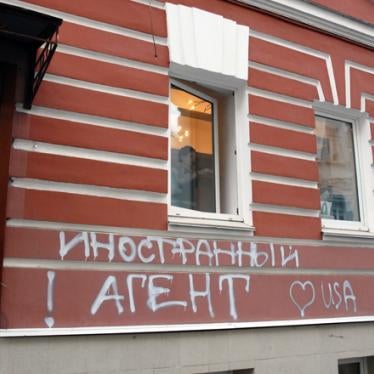News of Russia has dominated the Washington press for weeks. Whether, when, and to what extent President Trump and his advisors had contacts with Russian officials prior to his electoral win has provided endless fodder for pundits and politicians alike, not least in light of revelations that it is the subject of an FBI investigation. At the same time, there was deafening silence from the Trump administration as a Syrian bombing campaign with Russian help killed civilians in the northern city of Aleppo.
Surprisingly, despite Trump’s reluctance to date to criticize Putin’s human rights record (Trump’s infamous “You think our country’s so innocent?” retort comes to mind), the administration spoke up. A State Department statement called on Russia “to immediately release all peaceful protesters” and affirmed that the Trump administration believes that “[d]etaining peaceful protesters, human rights observers, and journalists is an affront to core democratic values.” The White House press secretary, Sean Spicer, read the statement aloud in the White House briefing on Monday. There was however no tweet on the issue from either Trump’s personal Twitter account or the official presidential account.
But it is a sign that the growing pressure from Congress and the US public is working. The widespread condemnation of Trump’s attempts to cozy up to Vladimir Putin is increasingly coming from Trump’s own party – from Senator Marco Rubio’s strong questioning of then-nominee for Secretary of State Rex Tillerson to Senator Lindsey Graham’s hearing on Russian aggression towards it neighbors.
Senator Ben Sasse, a Nebraska Republican, called on the administration to speak up about the protests, declaring, “Free speech is what we’re all about and Americans expect our leaders to call out thugs who trample the basic human rights of speech, press, assembly, and protest.” Senator Ben Cardin of Maryland, a leading Democratic voice in the Senate on Russia’s human rights abuses, also urged the Trump administration in a statement on Sunday to make human rights and democratic principles a priority in its relations with Russia.
Russian authorities deemed most of the 95 protests ‘illegal’ – unsurprising, given the increasingly repressive environment and closing space for discontent in Russia. Under a crackdown that began in 2012, Russian authorities have harshened penalties for unsanctioned protests, and allowed few protests that are critical of the government. Russian authorities have also clamped down on free and opposition media, restricted internet access, and imposed new laws that restrict nongovernmental groups and activists.
This domestic crackdown has of course occurred as President Vladimir Putin has positioned himself as a strong man who can restore Russia’s reputation on the world stage as a great power. Yet he has done so by supporting Syrian President Bashar al-Assad’s weak grasp on power in Syria and seizing Crimea in Ukraine. Human Rights Watch has documented the horrifying effects of this foreign policy, from questions about its role in war crimes in Aleppo to the pervasive climate of fear and repression in Crimea. Russia’s promises to abide by international law by impartially investigating civilian casualties from Russian airstrikes in Syria appear to have been broken.
With Russia’s economic crisis, the Kremlin needs to sell the public on his victories and portray Putin’s leadership as the only solution to the country’s problems. By clamping down on a free press, by controlling all media and internet access, the Kremlin has promoted a fanciful narrative that projects an image of Russian power and strength on the world stage.
But the protests are an indication that this strategy has limited effectiveness and that young people at least are hearing other messages. The weekend protests, while small relative to 2011, highlighted growing public discontent with the economic situation. No one knows exactly how much Russia is spending on military campaigns abroad, but the operations in Syria cannot be cheap. Meanwhile, real household incomes in Russia declined by as much as 15 percent between 2014 and late 2016 according to some estimates, yet many powerful people have amassed colossal personal wealth, exacerbating the country’s staggering economic inequality. Transparency International ranked Russia 131 out of 174 countries on its corruption index in 2016.
Now more than ever, US officials should make clear to the Kremlin that the US will not partner with Putin on his abusive campaign in Syria, and that the US will speak out against Russia’s repressive policies at home. If Trump really wants to pursue a close relationship with Putin the least he can do is use that to pressure him to ease up on nongovernmental groups. Many of the weekend protesters were young. They made clear that they want a future free of corruption. Despite the Kremlin’s tight control of the media, messages do reach them. The message from the US should be one of solidarity and support, as the young Russians press for basic human rights and freedoms. Let that be the story that dominates the Washington press this week.









